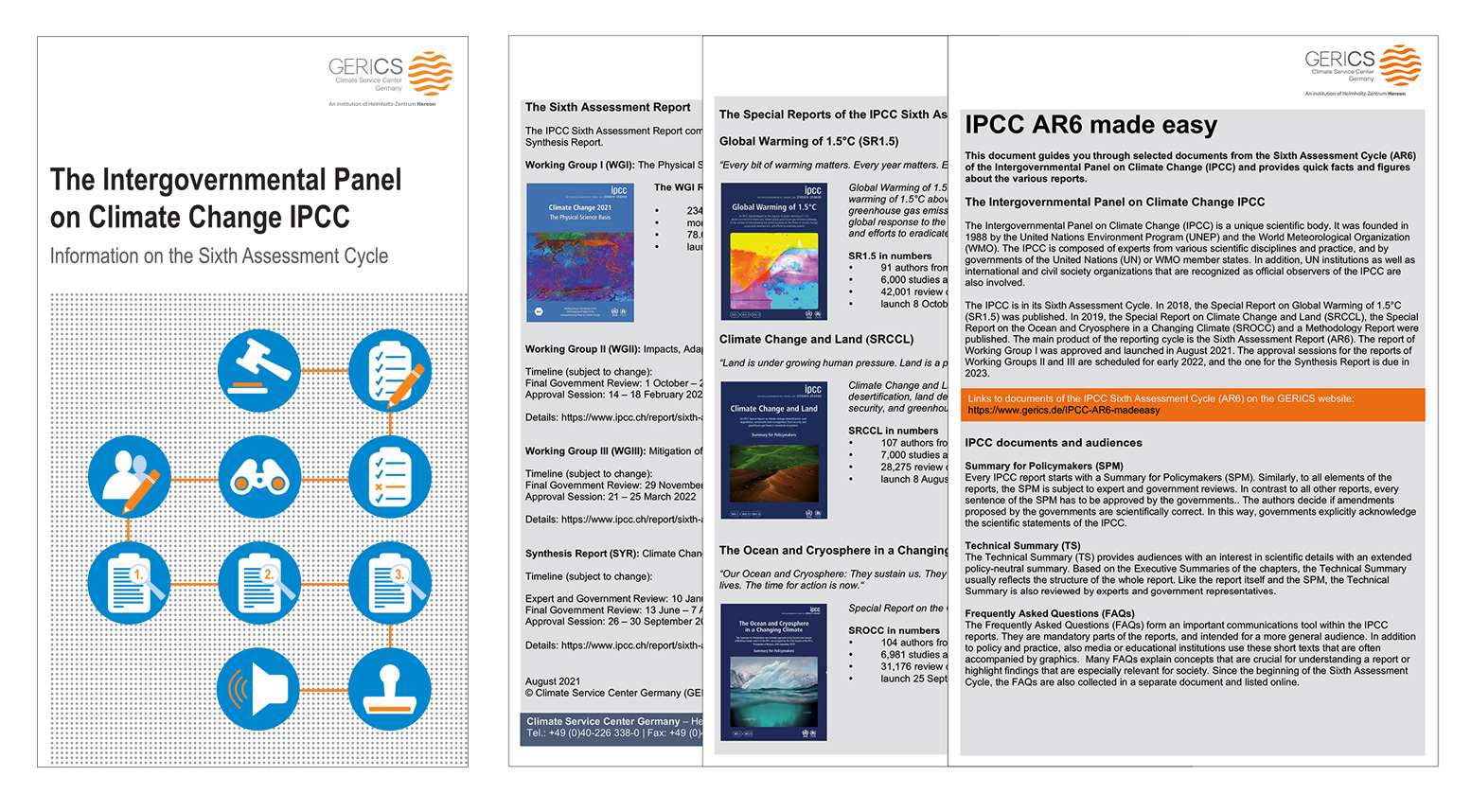The Climate Service Center Germany (GERICS) is offering support to researchers, policymakers and practitioners in deciphering complex IPCC reports, highlights Scientist Maike Nicolai
In its current Sixth Assessment Cycle, the Intergovernmental Panel on Climate Change (IPCC) offers a wealth of up-to-date knowledge to inform decisions for climate change adaptation and mitigation. A first leaflet of the Climate Service Center Germany (GERICS) explains the basics of the IPCC process in detail. With a second leaflet “IPCC made easy”, GERICS helps interested readers find exactly the IPCC documents they are looking for.
With three Special Reports, one Methodology Report and the three extensive Working Group contributions to the Sixth Assessment Report, the IPCC provides researchers, policymakers and practitioners with the best available information on the physical science basis, vulnerabilities as well as adaptation and mitigation of climate change. But, where to start? And how to interpret and put this wealth of evidence into practice?
Two leaflets developed by GERICS help users navigate through the IPCC reports. They form a quick and easy entry point to those parts of the reports that are most relevant for practical decisions about climate change mitigation and adaptation. In addition, short texts shed light on the unique process that brings science and policy together to ensure the robustness and usefulness of the IPCC assessments for global climate action. Both documents are available in English and German. They are updated continuously to include information about forthcoming IPCC reports.
The leaflet “The Intergovernmental Panel on Climate Change IPCC: Information on the Sixth Assessment Cycle” describes the basics that are key to understanding what makes the IPCC the central source of science-based information for decisions from regional to international level. Questions addressed include: Who develops the IPCC reports? How does the process work, with its drafting and review phases as well as the final approval by representatives of IPCC member governments? How do IPCC reports inform the United Nations Framework Convention on Climate Change (UNFCCC) and its annual Conference of the Parties (COP)? A special focus is on the Paris Agreement that led to the development of the Special Report on Global Warming of 1.5°C.
 The “IPCC made easy” gives an overview of the reports of the Sixth Assessment Cycle. In addition to the short downloadable print version presenting the essential facts and figures, the extended online version lists the most important resources available through the IPCC website.
The “IPCC made easy” gives an overview of the reports of the Sixth Assessment Cycle. In addition to the short downloadable print version presenting the essential facts and figures, the extended online version lists the most important resources available through the IPCC website.
As a first orientation, the mandatory parts of the IPCC reports most suitable for a wider audience are highlighted:
- The Summary for Policymakers (SPM) that is placed at the beginning of each report and has been approved by IPCC member governments.
- The Technical Summary (TS) which is based on the chapters’ Executive Summaries (ES) and reflects the structure of the whole report.
- The Frequently Asked Questions (FAQs) that are embedded in the chapters, and address readers from a more general audience.
- For each of the three Special Reports, some key numbers are given. Links to the SPM, TS and FAQs are provided via the GERICS website:
- Global Warming of 1.5°C (SR1.5).
- Climate Change and Land (SRCCL).
- The Ocean and Cryosphere in a Changing Climate (SROCC).
Information and links for the Working Group I Report are provided in the leaflet, while for the upcoming reports of WG II and III and the Synthesis Report, the timeline and a link to the outline are listed. To incorporate the contributions of the three IPCC Working Groups to the Sixth Assessment Report, the online version of “IPCC made easy” will be updated after each approval session.
For more information and downloads click here.
Please note: This is a commercial profile











